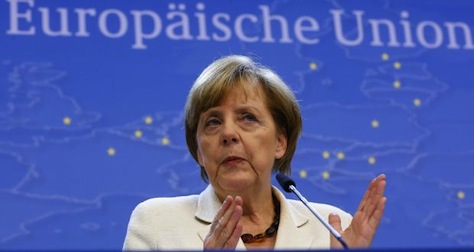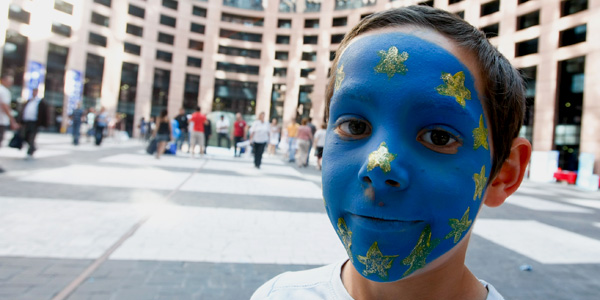Three days after the European elections, the reverberations are still shaking the entire continent, with leaders at the national and European level firing the first shots in what promises to be an epic battle over European integration — and that will determine who really calls the shots in the European Union.![]()
Last night, at an informal meeting of the European Council, the leaders of all 28 member-states of the European Union met to discuss how to approach the election of the next president of the European Commission, the powerful regulatory and executive arm of the European Union. The term of current president José Manuel Barroso, who has served in the role since 2004, will end within six months.
* * * * *
RELATED: In depth — European parliamentary elections
RELATED: The European parliamentary elections are real four contests
* * * * *
They poured cold water on the notion that they would automatically propose former Luxembourg prime minister Jean-Claude Juncker as Commission president. Since Sunday, Juncker has stridently made his case that as the Commission presidential candidate (the ‘Spitzenkandiat‘) of the European People’s Party (EPP), which won the greatest number of seats in Sunday’s EU-wide elections, he should have the first right to attempt to assemble a parliamentary majority. That’s a position that, ironically, even the center-left Party of European Socialists (PES), the second-largest bloc in the European Parliament has endorsed:
Commenting on the leaders’ decision, outgoing Socialist group leader Hannes Swoboda tweeted that it’s “absurd that Juncker has our backing to start negotiations but is blocked in the Council by his own EPP family!”
It’s already starting to appear that, behind the scenes, the EPP, which won around 214 seats, and the PES, which won around 191 seats, are coming closer to forming a ‘grand coalition’ to back Juncker’s candidacy in a bid to assert the precedent that the Parliament should be the institution to determine the Commission presidency, not the Council. Both Juncker and the PES Spitzenkandidat, German social democrat Martin Schulz, have argued repeatedly that the Parliament should reject any Commission president that wasn’t among the original Spitzenkandidaten.
But it’s not so simple. The Commission president must win not only a parliamentary majority. He or she must also win a qualified majority among the heads of government and state that comprise the Council, and enthusiasm among those leaders seems to be flagging for Juncker.
* * * * *
RELATED: Here come the Spitzenkandidaten! But does anybody care?
* * * * *
The key player, German chancellor Angela Merkel (pictured above), seemed testy in two press conferences since the election when asked about the looming showdown. As the leader of one of the top parties in the EPP, she officially supports Juncker, but her comments should hardly give Juncker comfort:
She also thanked Juncker for the “good campaign” he ran for the European People’s Party, but seemed slightly irritated by the avalanche of questions as to whether she backs Juncker to become the next EU commission president.
“I don’t decide who gets the post. Juncker is our candidate, the EPP candidate, and we will put his name forward in the discussions. It’s always been said that it’s up to the strongest group to put forward the candidate, but just being the strongest group is not enough, a majority is required,” she said.
Among national leaders, even among EPP stalwarts, Juncker’s candidacy is being met with skepticism. Hungarian prime minister Viktor Orbán and Swedish prime minister Fredrik Reinfeldt oppose Juncker outright. So does British prime minister David Cameron, whose position remains influential, even though the Conservative Party left the EPP in 2009. Dutch prime minister Mark Rutte, who is also close to Merkel, though he’s a member of the liberal bloc in the European Parliament, has also expressed private reservations about Juncker, and the media has openly discussed the idea that the Council could recruit Christine Lagarde, the former French finance minister and the current managing director of the International Monetary Fund, as its candidate instead. Intriguingly, Cameron has suggested that he might favor Danish social democratic prime minister Helle Thorning-Schmidt as Commission president.
Continue reading The mother-of-all-battles over European integration has begun

